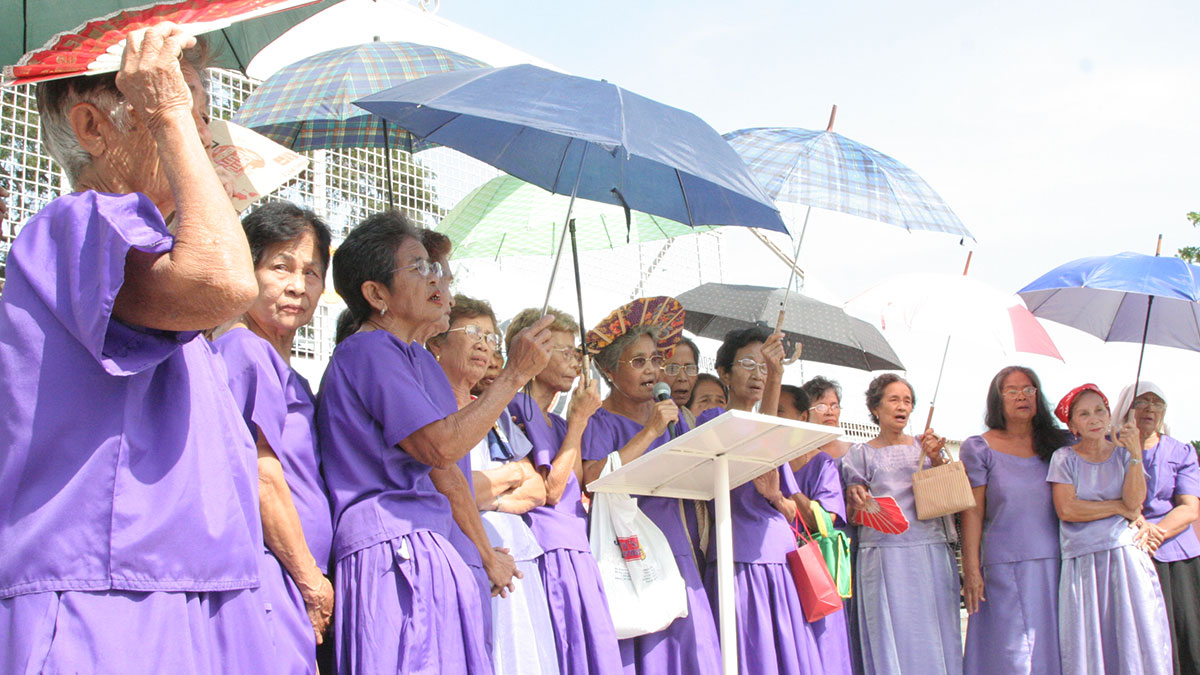
NOW DOWN TO 18 In this file photo taken in 2007, the Malaya Lolas counted around 70 out of 96 women in 1996 when they first spoke of the sexual abuses by Japanese soldiers during World War II. This April, only 18 women are still alive, mostly bedridden by ailments and old age. TONETTE T. OREJAS
ANGELES CITY, PAMPANGA, Philippines — The financial aid given by the administration of President Ferdinand Marcos Jr. to survivors of wartime sexual slavery by the Imperial Japanese Army is “not in compliance” with the decision of the United Nations to help them, the women’s group Kaisa-Ka said.
Lawyer Virginia Lacsa Suarez, chair of Kaisa-Ka, pointed this out in a forum held before the launch of the exhibit “Behind the Battle of the Malaya Lolas” at the Museum of Philippine Social History here on April 13.
Kaisa-Ka is a support group of Malaya Lolas (Free Grandmothers) who spoke about the sexual abuse of Japanese soldiers, starting with the Nov. 23, 1944, attack on Barangay Mapaniqui in Candaba town in Pampanga.
READ: High time PH ensures justice for ‘Malaya Lolas’
Since 1996
Since they opened up about their ordeal in 1996, they only obtained the favorable UN decision on March 8, 2023, after the Center for International Law in the Philippines, through lawyer Romel Regalado Bagares, filed a complaint on behalf of 24 of the 96 Malaya Lolas.
“The P10,000 given thrice by the Department of Social Welfare and Development (DSWD) to the 18 surviving Malaya Lolas under its women-in-conflict program and the P5,000 educational aid given to as many as three grandchildren per Malaya Lola do not comply with the March 8, 2023, decision of the Committee on the Elimination of Discrimination against Women (Cedaw) of the United Nations,” Suarez explained to an audience gathered at the Alaya Women’s Center.
The DSWD’s aid came after Marcos issued a letter of instruction ordering government agencies to help the Malaya Lolas, Suarez said, adding that Kaisa-Ka also asked the Department of Health to provide medical services to the 18 survivors.
Neither the Philippine Commission on Women nor the Department of Justice had made public their written response to the UN decision or the actions undertaken from the list of recommendations.
READ: Gov’t aid ‘a step to justice’ for PH ‘comfort women,’ says Malaya Lola leader
Reparation scheme
In the 19-page decision, the Cedaw recommended that the Philippine government “establish an effective, nationwide reparation scheme to provide all forms of redress to victims of war crimes, including sexual violence, with equal access for men who are war veterans and women who are survivors of wartime sexual slavery…”
The decision told the government to establish a state-sanctioned fund to provide compensation and other forms of reparation to women who are victims of war crimes, particularly “the institutionalized system of wartime sexual slavery, to ensure the restoration of their dignity, value and personal liberty.”
It also called for the creation of a memorial to preserve the site of Bahay na Pula (Red House) in San Ildefonso town of Bulacan province, where the women were brought and raped, or establish another space to commemorate the women’s suffering.
The Cedaw cited “Optional Protocol” and asked the Philippines to “give due consideration to the views of the committee, together with its recommendations, and submit to the committee, within six months, a written response, including information on any action taken in the light of those views and recommendations.”
But the Philippine government had declined to help the Malaya Lolas, saying they had already received reparation funds from Japan after the war.
“The Malaya Lolas broke their silence only in 1996, so how could they have been compensated for the abuses?” asked Suarez.